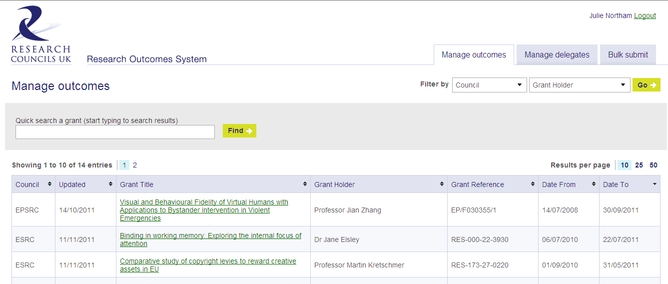 Last month Anita posted on the blog about the forthcoming RCUK Research Outcomes System (ROS) due to be launched imminently. That time has now come and the system is now live!
Last month Anita posted on the blog about the forthcoming RCUK Research Outcomes System (ROS) due to be launched imminently. That time has now come and the system is now live!
As of this week the ROS goes live for grant holders of AHRC, BBSRC, ESRC and EPSRC awards. The MRC and STFC are using the e-Val system and at present NERC is currently continuing to use its Research Outputs Database (ROD) until a decision has been reached regarding which collection system to replace it with. This week RCUK will be emailing all PIs of live awards with AHRC, ESRC and EPSRC to launch the ROS.
The ROS is a website that allows users to provide information about research outcomes to four Research Councils – AHRC, BBSRC, ESRC and EPSRC. Outcomes are categorised into nine areas:
- Publications
- Other Research Outputs
- Collaboration/Partnership
- Further Funding
- Staff Development
- Dissemination/Communication
- IP and Exploitation
- Award/Recognition
- Impact
The Research Councils will use the information to inform their analysis of research investments.
The ROS will be available at www.rcuk.ac.uk/researchoutcomes and you can log-in using your Je-S account details.
 A number of us in the R&KEO have viewed a demonstration of the new system and are able to help / advise as necessary. The system is fairly intuitive and RCUK have produced some good online guidance (recorded demonstrations or written help sheets), but do let me know if you have any questions and we’ll be happy to help.
A number of us in the R&KEO have viewed a demonstration of the new system and are able to help / advise as necessary. The system is fairly intuitive and RCUK have produced some good online guidance (recorded demonstrations or written help sheets), but do let me know if you have any questions and we’ll be happy to help.
Responsibility for updating the ROS lies with the PI, although Co-Is should also have access to update joint grants. The Research Councils will be undertaking an audit of how the ROS is being used in March 2012 so we will be looking at the system at the end of January 2012 to see the level of engagement and offering help where necessary.
Some key features of the ROS are as follows:
- Outcomes can be inputted at any time during the lifetime of a grant and beyond, not just at the end as with a final report.
- Existing data can be uploaded from HEIs own research information systems, therefore minimising the burden of having to re-submit information to the Research Councils. (We are currently investigating how best to do this at BU using the new publications management system BRIAN).
- A bulk upload option allows multiple outcomes for multiple grant holders to be inputted at the same time, therefore saving time and effort.
- HEIs will have access to the information submitted by grant holders from their institution to the ROS.
- Access to ROS can be delegated to any other Je-S registered users, including joint investigators or co-investigators, and research managers.
- Outcomes can be attributed to funding from more than one Research Council.
- The ROS takes account of and, where possible, accommodates the reporting requirements of other bodies, for example the UK Funding Councils’ Research Excellence Framework (REF) and Higher Education Statistics Agency (HESA) data returns.
You can read more about the ROS on the RCUK website here (including a set of excellent FAQs): http://www.rcuk.ac.uk/research/Pages/ResearchOutcomesProject.aspx











 Upcoming opportunities for PGRs – collaborate externally
Upcoming opportunities for PGRs – collaborate externally BU involved in new MRF dissemination grant
BU involved in new MRF dissemination grant New COVID-19 publication
New COVID-19 publication Conversation article: London Marathon – how visually impaired people run
Conversation article: London Marathon – how visually impaired people run MSCA Postdoctoral Fellowships 2024
MSCA Postdoctoral Fellowships 2024 Horizon Europe News – December 2023
Horizon Europe News – December 2023